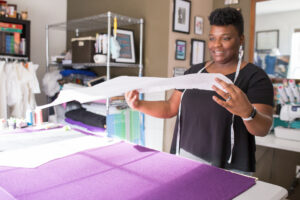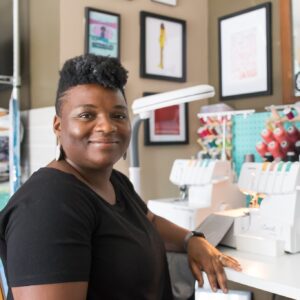News & Stories
Building businesses with impact

Some people enroll in business school because they want to help solve global problems and see business as the force for making that positive impact. Those were the intentions of Lysandra Gibbs Weber (MBA ’11) when she decided to enroll in the Full-Time MBA Program at UNC Kenan-Flagler Business School.
Having already earned a BS in economics at the Wharton School, Weber wanted to go beyond the bottom line in her studies and in her career.
“I was working in New York City as I was exploring grad schools,” she says. “I had been working in marketing, and I knew that with my MBA, I wanted to study how business could be a force for good. Because of this, I explored programs that incorporated sustainability, focusing on people and planet, in addition to profit. UNC Kenan-Flagler had one of the best graduate sustainable business programs in the U.S., which piqued my interest.”
Still, it wasn’t just curriculum that drew Weber to UNC Kenan-Flagler.
“I came to visit during Admitted Students Weekend before we all made our decisions to enroll. The people I met during that trip had me optimistically pondering, ‘These are my classmates? They are for sure my classmates!’ And I knew then that it was the place where I wanted to get my MBA. The people make UNC special.”
The faculty also made a big impression on Weber.
“My professors weren’t just offering a typical professor-student relationship,” she says. “I met people who I knew were going to offer mentorship, provide advice and be a part of my life and my community. I really appreciated the effort that UNC Kenan-Flagler made to build community around the student body. You’re going to school and getting your academic education, and you’re also building a professional network.”

“I knew that with my MBA, I wanted to study how business could be a force for good,” says Weber.
Project sustainability
One highlight of her time at UNC Kenan-Flagler was working on a project for the North Carolina Botanical Garden, which researches, catalogs, and promotes the state’s native plant species, as part of the STAR (Student Team Achieving Results) Program.
The challenge was to help the North Carolina Botanical Garden, which is part of UNC and its own nonprofit, develop earned income opportunities. It had just built the Education Center, a LEED-certified building, and wanted to find ways to create earned income from its use. Ideas included using it as a wedding venue, meeting space and enhanced classroom. Weber helped the team present these ideas to the board.
Weber helped manage the relationship between the STAR team and the organization, which helped her build her knowledge of sustainable business. The experience led to the North Carolina Botanical Garden inviting Weber to join its board, a position she held for about eight years, and sparked other board opportunities. Weber currently serves as an executive committee and board member for the Triangle Land Conservancy, a nonprofit that is a protector of “wild and working lands” in the Triangle region.
She previously served as a board member at the Conservation Trust for North Carolina, which is dedicated to “conserving land in ways that inspire and enable people to build resilient, just communities.” These opportunities allowed Weber to work directly with sustainable organizations while continuing to develop her professional career.
Life lessons
Business school also can help students grow personally. Weber describes a leadership immersion, where students dove into topics such as how to strengthen communities economically by creating business opportunities for people in lower-income regions, as helping her realize that “experts” don’t always have all the answers.
She and her classmates traveled to Nairobi to work with Carolina for Kibera (CFK) Africa, an NGO that works with community members to improve public health, educational outcomes and economic opportunities in informal settlements.
CFK was helping build a hospital and schools in lower-income areas of Nairobi. Weber had an epiphany that has shaped her approach to business moving forward.
“As business school students, we are of the mindset that we have all the solutions,” she says. “We stepped into this community with our presentations and solutions from a Western perspective. For me, it was really eye-opening that they had already created many of their own solutions out of necessity. I thought, ‘I’m learning from them about how they’ve created businesses from essentially nothing.’ We were young, in our 20s, thinking we had all the answers, and we left there having learned a tremendous amount from others in very different situations.”
The experience gave her a chance to consider character, how to motivate people and the many ways businesses can help create meaningful change. She says her experiences at UNC Kenan-Flagler help her be more thoughtful in her decision-making and the advice she provides to employers, clients and others in her life.
Beyond the classroom
Weber still applies other lessons she picked up at UNC Kenan-Flagler. She served as president of the School’s Net Impact chapter. During Earth Month, the group audited the School’s trash accumulation for a week in the center of the Business School lawn. It was an opportunity to combine her business skills with all that she was learning about sustainability. It yielded lessons that still resonate.
“It was a visual to share with people. It was the combination of marketing and sustainability,” says Weber. “You can tell people they have to recycle or they have to compost. When they see the volume of trash that we create and how much of it could have been diverted from the landfill by recycling or composting, there’s a visceral reaction.”
Another lesson that still hits home for Weber is the notion of asking for flexibility. There was a sustainability conference in Barcelona, but it began during exam week. She assumed the fixed date meant she could not go, but a teaching assistant suggested she talk to her professors. When she asked, the professors all said, “Don’t let the dates stop you.” Today, she’s more willing to ask for flexibility because of how those professors responded, reinforcing that there is more than one way of doing things.
“It’s because of the relationships the professors are willing to have with students at UNC Kenan-Flagler,” she says. “It’s not just a nine-to-five job for them. They’re trying to help us become good stewards of businesses. They’re open to working with us and they are understanding that there are experiences beyond the classroom that are important for our education.”

A sense of purpose
Weber embraced the wealth of opportunities at UNC Kenan-Flagler, including Net Impact, the Association of Minority Business Students, Carolina Women in Business (CWIB) and serving on the Career Services Advisory Board. She also was Dean’s Fellow, Consortium for Graduate Study in Management Fellow and Forte Foundation Fellow.
In addition to exploring sustainable business and leadership, she pursued coursework in entrepreneurship and found she has a knack for recognizing solid business plans.
In February 2024, she launched her marketing consulting firm, Lysandra Weber Marketing, where she regularly applies her business education. She focuses on helping change-making small companies build the foundation of their marketing programs.
She concurrently runs an independent clothing brand, geekchicfashion, which she designs herself. During the pandemic, she designed and produced a successful line of face masks. And she’s worked for a number of companies, including Burt’s Bees and Brooklyn Brewery, over the years.
With every experience, she brought with her lessons from the Business School.
“My experience at the Business School opened my eyes to a lot of things that I potentially wouldn’t have learned otherwise,” says Weber.
When she is not applying her business skills, she is with her son and daughter. As a family they like to go on walks and hiking adventures, volunteer and enjoy crafting together.
Family life is impacted by Weber’s time at UNC Kenan-Flagler and her choice of career. She wants to help her children understand the care they must have for the land around them, where it came from, who it belonged to first and how to continue protecting it. And she wants them to understand the importance of building community and being present for others, harkening back to her perspective on the professional network she values.
“We need community. I value being in a community with people who care both about the bottom line and the impact their business is going to have on the world,” says Weber. “That has always been a part of me.”